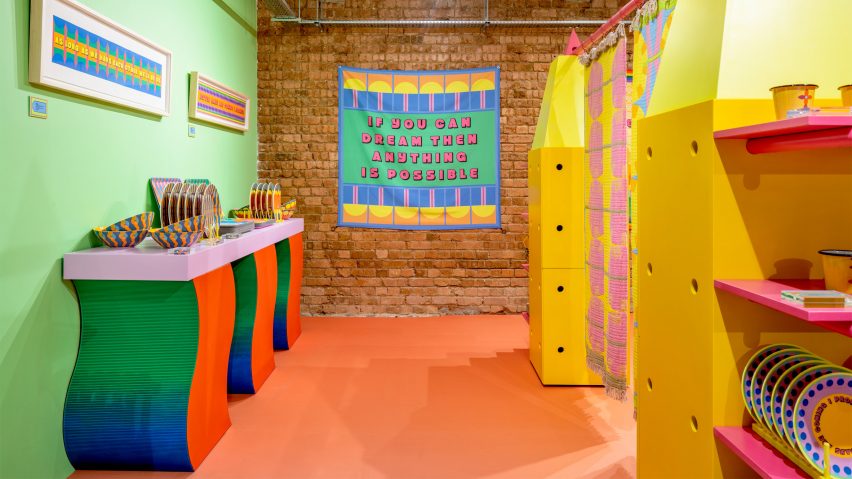Modular display stands modelled on buildings in Burkina Faso feature in the first brick-and-mortar shop that London-based designer Yinka Ilori has created for his self-titled homeware brand.
Taking over a compact retail space in Shoreditch in the leadup to Christmas, the pop-up shop features a colour-block interior designed to match the products on sale, as slime-green walls clash with pink and orange flooring.
This "more is more" philosophy to colour also extends onto the store's glossy lacquered product displays, designed by Ilori to reference the construction of mosques and homes in Burkina Faso.
"I am really obsessed with their design language which is very African, very rich and very unapologetic," he told Dezeen.
"There is a recurring use of squares and triangles and you sometimes also see poles sticking out of the structures. I found these poles fascinating. They are structural but also used to make it easy for people to climb up and repair the building."
In the store, these shapes are reflected in the modular storage units, which are constructed from medium-density fibreboard (MDF) and each topped with a stepped pyramid.
Strategically placed holes can be used much like those on a pegboard to add poles of different sizes and provide storage for a changing array of products.
Longer rails can be slotted in to hang T-shirts and throws, while smaller pegs can hold umbrellas or prop up shelves for presenting mugs, notebooks and other lifestyle items.
Bulkier items such as the designer's collection of tableware and limited-edition basketballs are displayed on counters panelled in ribbed MDF that is sprayed in a gradient of colours to emphasise their sinuous shapes.
At the store's entrance, six of Ilori's hand-painted Square Stools are arranged into a towering window display that shows off their stackability.
The opening of the pop-up also coincides with Ilori's latest product drop. Themed around "memory-making, togetherness and play", this includes everything from notebooks and basketballs finished in sunny, childlike patterns to a collectible version of the traditional Yoruban strategy game Ayo.
In line with this idea, the shop will also host different events for the local community, from an Ayo tournament to a tasting of Nigerian palm wine.
Opening his first physical store is "an absolute dream come true", Ilori said.
"My public projects are all about interaction both between audiences and with the work itself but I don't often get to interact directly with people and I feel it's time for me to do that," he added.
"Through the store, I'm able to get their feedback on my work and also see how they interact with each of the products and the stories I'm trying to tell through these pieces."
Ilori started his homeware brand in 2020 with the aim of reworking "unexpected, functional household items as artworks" by imbuing them with bold colours and patterns that reference his British-Nigerian heritage.
The products feature many of the same patterns he previously developed for his large-scale installations, such as The Colour Palace pavilion he created for the London Festival of Architecture together with local studio Pricegore.
The photography is by Ed Reeve.

